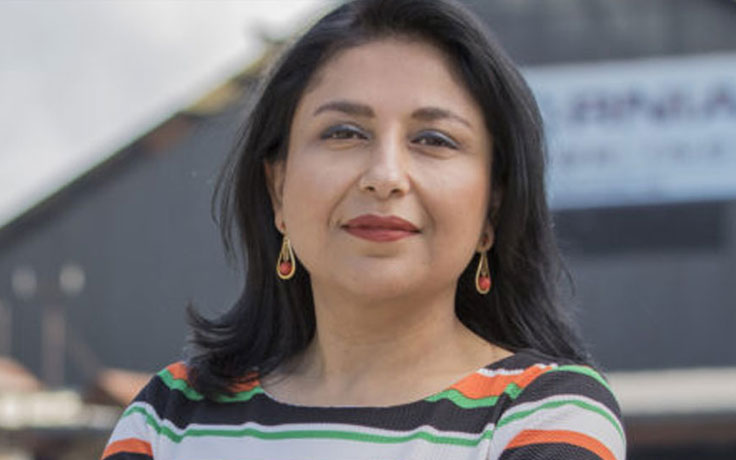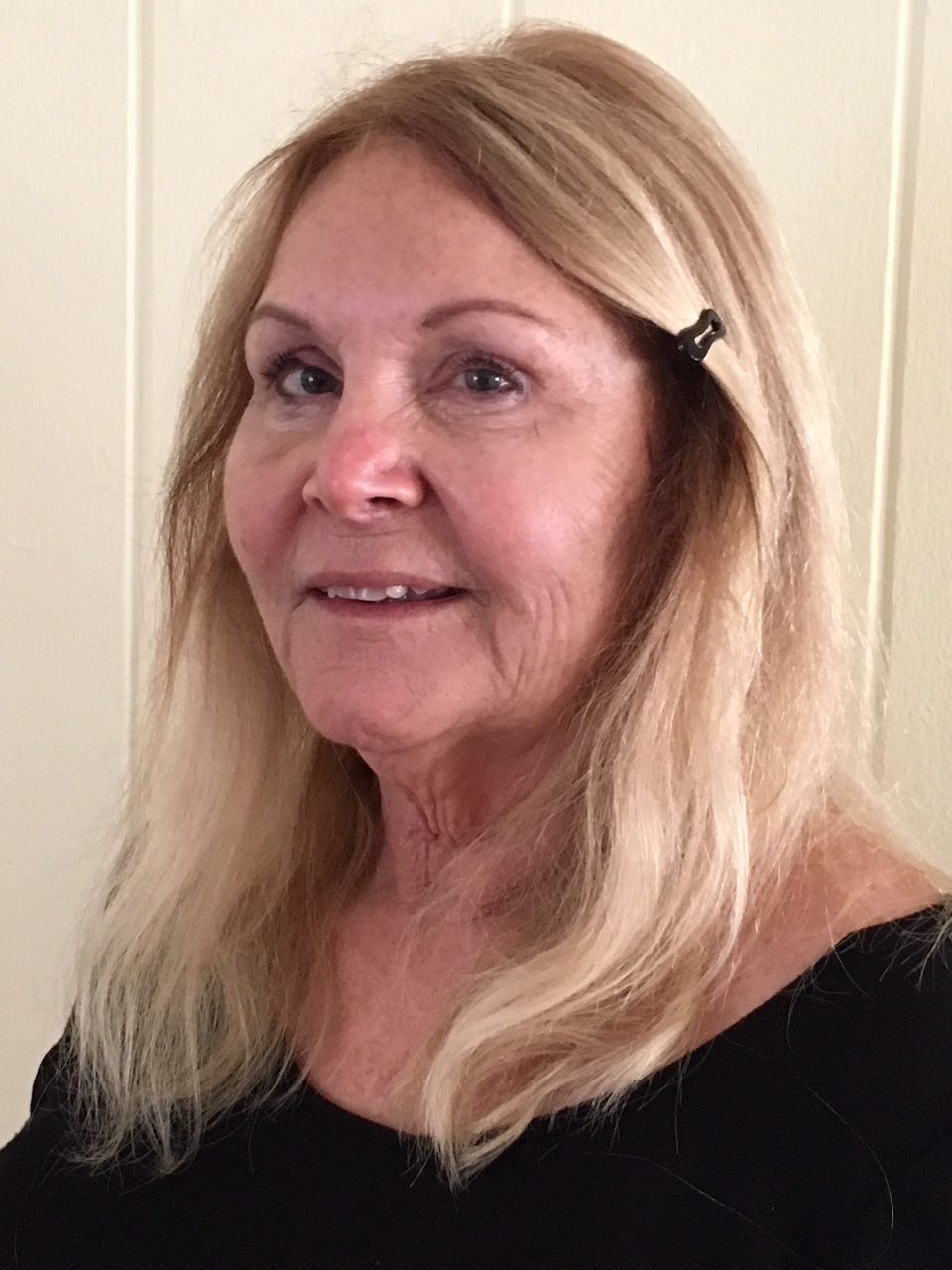WHEN ANANYA ROY WAS OFFERED the opportunity to oversee a new institute dedicated to furthering social justice, she didn’t hesitate to leave her UC Berkeley professorship and move to UCLA. “I saw this as an opportunity to think about how the public university can be a key space for making social justice in the world,” Roy said in a Zoom interview from her West Hollywood home.
She was drawn by “a very clear sense of mission that comes from a public university,” Roy said, appearing before the institute’s backdrop, a setting that has come in handy for online meetings and conferences she has conducted from home since the COVID-19 pandemic forced the physical shutdown of hundreds of businesses and institutions, including UCLA.
Little did Roy know, when she arrived at UCLA in 2016 to become the founding director of the Institute on Inequality and Democracy at the Luskin School of Public Affairs, that she would find herself engulfed this year in a twin-crisis-driven living laboratory. Roy and the institute have been swept up in a spring and summer defined by economic fallout from the COVID-19 pandemic — including a deepening affordable-housing crisis — and the waves of protests brought on by a series of deaths of Black people at the hands of police across the nation.
The cascading sense of crisis that enveloped the United States in those months has led to sharply divergent reactions. Some have demonstrated on behalf of Black lives, others have characterized those protests as threatening or worse. Led by President Trump, some have demanded that “law and order” reclaim the streets in cities such as Portland and Seattle; demonstrators, meanwhile, have pointed to overwhelmingly peaceful protests on matters of long-standing moral urgency.
The clashes laid bare the race-and-poverty-based inequities that have festered in the United States for decades. And the combination meshed squarely with the institute’s mission to ad- vance “radical democracy in an unequal world through research, critical thought, and alliances with social movements and racial justice activism.”
“Unlike other research centers, this institute, from the start, has had a commitment to enter into partnerships with community organizations,” Roy said. “We have worked very hard to think about what are the actual practices to build this kind of partner- ship and make it real. … I report to the dean of the Luskin School, but I am accountable to the communities of Los Angeles.”
A lifetime battling inequality
Born in Calcutta in 1970, Roy attributes her passion for battling inequalities in the world to her upbringing by parents who instilled in her a “tremendous commitment to learning. She witnessed the “vast inequities” that exist in India as well as other democracies.
She left home at age 18 to attend Mills College in Oakland, then went on to earn advanced degrees from UC Berkeley and became a professor there of city and regional planning and held the distinguished chair in global poverty and practice.
While at Berkeley, she participated in campus protests, worked in many different programs around poverty and social justice and began writing academic books. Her marriage to another faculty member had ended by the time she decided to leave the Bay Area for the UCLA job.
Friends warned she would be unhappy in L.A. but she dis- covered otherwise. “I love being in Los Angeles,” Roy said. “It has such an incredible history of movements, communities and organizations!”
Despite her hectic schedule, Roy tries to find time to talk to her mother, a retired teacher in India, every morning. And even then, she is haunted by events. Roy worries that she wouldn’t be able to visit should her mother become ill. Roy has an American passport and could be denied admission because of the pandemic and this country’s reckless response, which has rendered it an international pariah.
The urgent need for housing
Roy and the Institute have made housing a priority, and the economic meltdown caused by the pandemic has given this priority an extra urgency. Countless working-class jobs have been lost, many held by people of color. This made an “already terrible” housing shortage even worse, because many who were already struggling to pay their rent faced even graver challenges. A temporary stay against evictions, along with other rent-relief measures, Roy said, have not gone far enough to solve the underlying issues of unaffordable housing.
As the coronavirus pandemic and economic crisis deepened over the summer, the institute produced three research-based reports defining the scope of the problem and suggesting solutions. In the first, “UD Day,” (referring to “unlawful detainers,” or eviction notices), retired law professor Gary Blasi found that 600,000 households in Los Angeles County used 90% of their income for rent even before the pandemic. Without action by officials, Blasi wrote, many of them faced eviction. Roy has been critical of government inaction. “Now what we face,” she said, “is absolutely terrifying.”
The second report, “Hotel California,” takes officials to task for being too slow to enact a program to pay for hotel rooms to get homeless people off the streets during the pandemic. It calls for use of eminent domain, not just negotiations with hotel owners, to house more people. Noting that many of downtown L.A.’s hotels were built with public subsidies, Roy believes there should be “fair compensation, but commandeering.”
“No government in California has been willing to do that,” despite having the legal authority to do so, Roy said.
She further expressed her frustration with a tweet later in the summer: “California legislators and political executives are wringing their hands over the impending eviction crisis. It’s a crisis of their own making.“
The third report, “For the Crisis Yet to Come: Temporary Settlements in the Era of Evictions,” calls for temporary sanctions and support services for self-organized communities of homeless living on the streets, but only as a stopgap until they can be housed.
ON MAY 25, MINNEAPOLIS POLICE suffocated George Floyd, the latest in a series of police killings of Black people around the nation. It touched off a storm of protests by Black Lives Matter and others. Two days later, Roy tweeted, “Now, and always, is the time for universities to divest from the murderous apparatus that is the police.”
Then a local protest thrust Roy into the center of a controversy on her own campus. She learned that, on June 1, UCLA had allowed the Los Angeles Police Department to use the leased Jackie Robinson Stadium as a holding area for detained protesters. She and 58 other faculty issued a public letter excoriating the university and urging it to cut ties with the LAPD. Roy also tweeted her outrage and soon helped form a committee that seeks to dismantle the campus police and replace it with a more safety-oriented organization.
Intense and determined, Roy in mid-August challenged her own department in a tweet criticizing the Luskin School’s support for more money for the LAPD: “When I fight for divestment from policing at UCLA this includes challenging the harm done by university research that continues to legitimize & whitewash policing.”
The pandemic deepens suffering
The mid-March advent of pandemic-induced shutdowns encouraged Roy to step up an already brisk pace of research projects, conferences and meetings, all now online as she works from home. She also has found time to give media interviews and write opinion pieces. Protest does not rest in a pandemic.
The pandemic has robbed her of going to the gym, her favorite recharging tool, and prevented her from making a trip to India to celebrate her mother’s birthday in August. It is her work, she said, that gives her a renewed sense of purpose and the strength to continue.
“It’s difficult to do self-care now,” Roy said, “but if we have energy and health, we need to use it for good purpose.”
Roy said she remains positive and more determined than ever in her work at UCLA. She believes its students, whether coming from poverty or lives of privilege, share a commitment to social justice.
“The public university has a role to play in creating a more equal society,” Roy said, explaining why she has spent her career at the University of California despite opportunities to work elsewhere.
“All the troublemaking I did” in challenging UCLA’s administration over policing and, years earlier, budget protests at Berkeley, were “because this is the university I love.”
“At the center of it all,” Roy added, “I’m a teacher, I’m a scholar, and I’m totally committed to this endeavor of the university.”

























